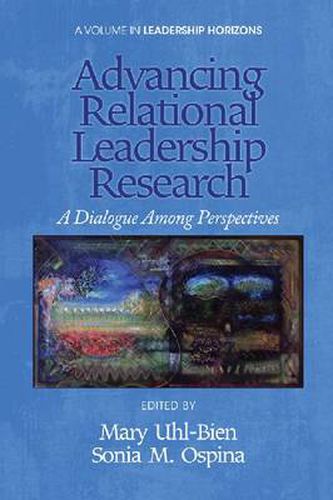Readings Newsletter
Become a Readings Member to make your shopping experience even easier.
Sign in or sign up for free!
You’re not far away from qualifying for FREE standard shipping within Australia
You’ve qualified for FREE standard shipping within Australia
The cart is loading…






This title is printed to order. This book may have been self-published. If so, we cannot guarantee the quality of the content. In the main most books will have gone through the editing process however some may not. We therefore suggest that you be aware of this before ordering this book. If in doubt check either the author or publisher’s details as we are unable to accept any returns unless they are faulty. Please contact us if you have any questions.
Leaders and followers live in a relational world-a world in which leadership occurs in complex webs of relationships and dynamically changing contexts. Despite this, our theories of leadership are grounded in assumptions of individuality and linear causality. If we are to advance understandings of leadership that have more relevance to the world of practice, we need to embed issues of relationality into leadership studies.
This volume addresses this issue by bringing together, for the first time, a set of prominent scholars from different paradigmatic and disciplinary perspectives to engage in dialogue regarding how to meet the challenges of relationality in leadership research and practice. Included are cutting edge thinking, heated debate, and passionate perspectives on the issues at hand. The chapters reveal the varied and nuanced treatments of relationality that come from authors’ alternative paradigmatic (entity, constructionist, critical) views. Dialogue scholars-reacting to the chapters-engage in spirited debate regarding the commensurability (or incommensurability) of the paradigmatic approaches. The editors bring the dialogue together with introductory and concluding chapters that offer a framework for comparing and situating the competing assumptions and perspectives spanning the relational leadership landscape. Using paradigm interplay they unpack assumptions, and lay out a roadmap for relational leadership research. A key takeaway is that advancing relational leadership research requires multiple paradigmatic perspectives, and scholars who are conversant in the assumptions brought by these perspectives.
The book is aimed at those who feel that much of current leadership thinking is missing the boat in today’s complex, relational world. It provides an essential resource for all leadership scholars and practitioners curious about the nature of research on leadership, both those with much research exposure and those new to the field.
$9.00 standard shipping within Australia
FREE standard shipping within Australia for orders over $100.00
Express & International shipping calculated at checkout
This title is printed to order. This book may have been self-published. If so, we cannot guarantee the quality of the content. In the main most books will have gone through the editing process however some may not. We therefore suggest that you be aware of this before ordering this book. If in doubt check either the author or publisher’s details as we are unable to accept any returns unless they are faulty. Please contact us if you have any questions.
Leaders and followers live in a relational world-a world in which leadership occurs in complex webs of relationships and dynamically changing contexts. Despite this, our theories of leadership are grounded in assumptions of individuality and linear causality. If we are to advance understandings of leadership that have more relevance to the world of practice, we need to embed issues of relationality into leadership studies.
This volume addresses this issue by bringing together, for the first time, a set of prominent scholars from different paradigmatic and disciplinary perspectives to engage in dialogue regarding how to meet the challenges of relationality in leadership research and practice. Included are cutting edge thinking, heated debate, and passionate perspectives on the issues at hand. The chapters reveal the varied and nuanced treatments of relationality that come from authors’ alternative paradigmatic (entity, constructionist, critical) views. Dialogue scholars-reacting to the chapters-engage in spirited debate regarding the commensurability (or incommensurability) of the paradigmatic approaches. The editors bring the dialogue together with introductory and concluding chapters that offer a framework for comparing and situating the competing assumptions and perspectives spanning the relational leadership landscape. Using paradigm interplay they unpack assumptions, and lay out a roadmap for relational leadership research. A key takeaway is that advancing relational leadership research requires multiple paradigmatic perspectives, and scholars who are conversant in the assumptions brought by these perspectives.
The book is aimed at those who feel that much of current leadership thinking is missing the boat in today’s complex, relational world. It provides an essential resource for all leadership scholars and practitioners curious about the nature of research on leadership, both those with much research exposure and those new to the field.